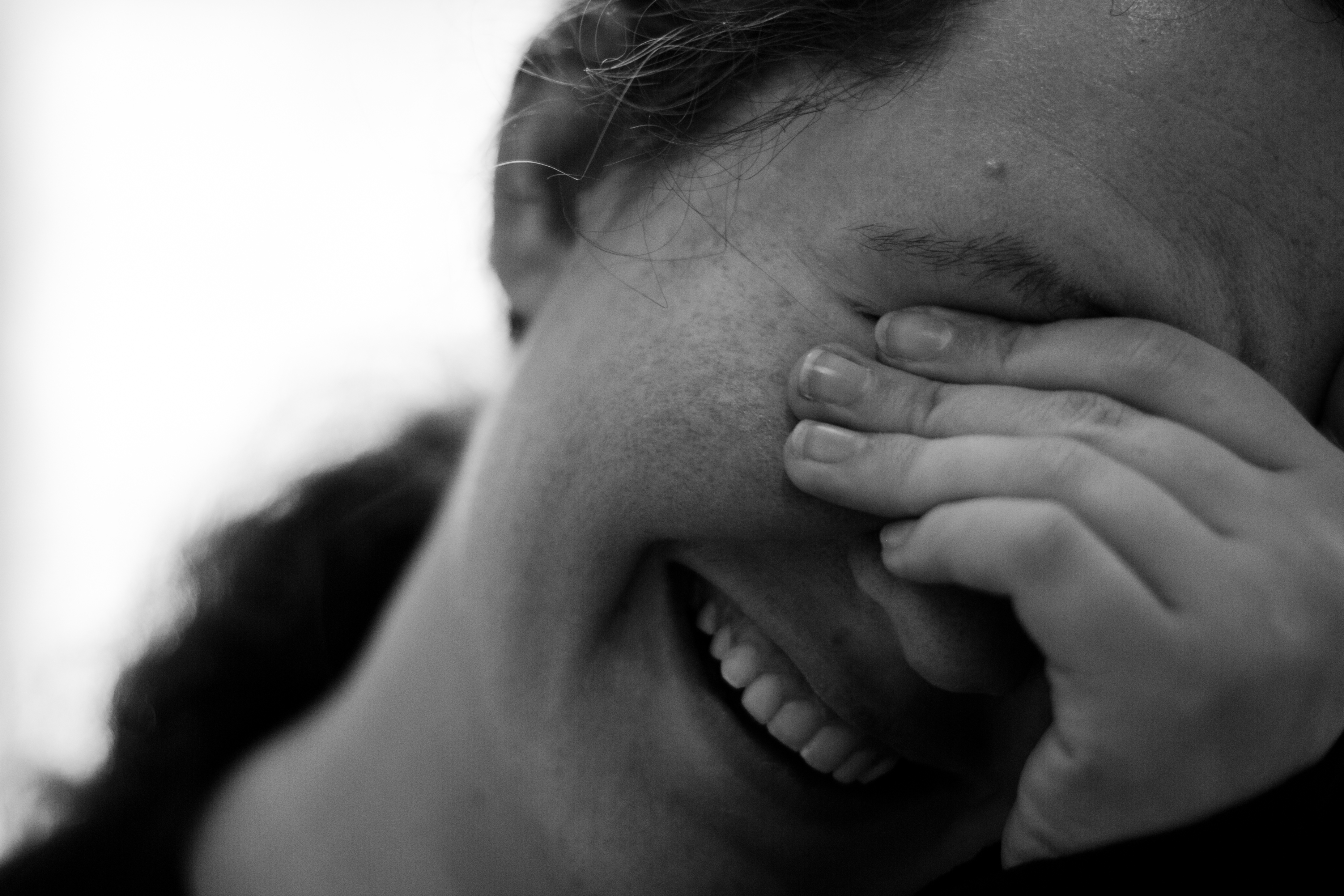|
Embarrassment
Embarrassment or awkwardness is an emotional state that is associated with mild to severe levels of discomfort, and which is usually experienced when someone commits (or thinks of) a socially unacceptable or frowned-upon act that is witnessed by or revealed to others. Frequently grouped with shame and guilt, embarrassment is considered a " self-conscious emotion", and it can have a profoundly negative impact on a person's thoughts or behavior. Usually, some perception of loss of honor or dignity (or other high-value ideals) is involved, but the embarrassment level and the type depends on the situation. Causes Embarrassment can be personal, caused by unwanted attention to private matters or personal flaws or mishaps or shyness. Some causes of embarrassment stem from personal actions, such as being caught in a lie or in making a mistake. In many cultures, being seen nude or inappropriately dressed is a particularly stressful form of embarrassment (see modesty). Personal ... [...More Info...] [...Related Items...] OR: [Wikipedia] [Google] [Baidu] |
Vicarious Embarrassment
Vicarious embarrassment (also known as secondhand, empathetic, or third-party embarrassment and also as Spanish shame or in German) is the feeling of embarrassment from observing the embarrassing actions of another person. Unlike general embarrassment, vicarious embarrassment is not the feelings of embarrassment for yourself or for your own actions, but instead by feeling embarrassment for somebody else after witnessing (verbally and/or visually) that other person experience an embarrassing event. These emotions can be perceived as pro-social, and some say they can be seen as motives for following socially and culturally acceptable behavior. Vicarious embarrassment (German: ''Fremdscham'') is often seen as an opposite to ''schadenfreude'', which is the feeling of pleasure or satisfaction at misfortune, humiliation or embarrassment of another person. Vicarious embarrassment is different from an emotional contagion, which is when a person unconsciously mimics the emotions that ... [...More Info...] [...Related Items...] OR: [Wikipedia] [Google] [Baidu] |
Shame
Shame is an unpleasant self-conscious emotion often associated with negative self-evaluation; motivation to quit; and feelings of pain, exposure, distrust, powerlessness, and worthlessness. Definition Shame is a discrete, basic emotion, described as a Moral emotions, moral or social emotion that drives people to hide or deny their wrongdoings.Shein, L. (2018). "The Evolution of Shame and Guilt". PLoSONE, 13(7), 1–11. Moral emotions are emotions that have an influence on a person's decision-making skills and monitors different social behaviors. The focus of shame is on the self or the individual with respect to a perceived audience. It can bring about profound feelings of deficiency, defeat, inferiority, unworthiness, or self-loathing. Our attention turns inward; we isolate from our surroundings and withdraw into closed-off self-absorption. Not only do we feel alienated from others but also from the healthy parts of ourselves. The Social alienation, alienation from the wor ... [...More Info...] [...Related Items...] OR: [Wikipedia] [Google] [Baidu] |
Emotion
Emotions are physical and mental states brought on by neurophysiology, neurophysiological changes, variously associated with thoughts, feelings, behavior, behavioral responses, and a degree of pleasure or suffering, displeasure. There is no scientific consensus on a definition. Emotions are often reciprocal determinism, intertwined with mood (psychology), mood, temperament, personality psychology, personality, disposition, or creativity. Research on emotion has increased over the past two decades, with many fields contributing, including psychology, medicine, history, sociology of emotions, computer science and philosophy. The numerous attempts to explain the origin, functional accounts of emotion, function, and other aspects of emotions have fostered intense research on this topic. Theorizing about the evolutionary origin and possible purpose of emotion dates back to Charles Darwin. Current areas of research include the neuroscience of emotion, using tools like positron ... [...More Info...] [...Related Items...] OR: [Wikipedia] [Google] [Baidu] |
Guilt (emotion)
Guilt is a Moral emotions, moral emotion that occurs when a person belief, believes or understanding, realizes—accurately or not—that they have compromised their own standards of conduct or have violated universal Morality, moral standards and bear significant moral responsibility, responsibility for that violation. Guilt is closely related to the concepts of remorse, regret, and shame. Guilt is an important factor in perpetuating obsessive–compulsive disorder symptoms. Etymology The etymology of the word is obscure, and developed its modern spelling from the Old English form ''gylt'' "crime, sin, fault, fine, debt", which is possibly derived from Old English ''gieldan'' "to pay for, debt". Because it was used in the Lord's Prayer as the translation for the Latin ''debitum'' and also in Matthew xviii. 27, and ''gyltiȝ'' is used to render ''debet'' in Matthew xxiii. 18, it has been inferred to have had the primary sense of ‘debt’, though there is no real evidence ... [...More Info...] [...Related Items...] OR: [Wikipedia] [Google] [Baidu] |
Anxiety
Anxiety is an emotion characterised by an unpleasant state of inner wikt:turmoil, turmoil and includes feelings of dread over Anticipation, anticipated events. Anxiety is different from fear in that fear is defined as the emotional response to a present threat, whereas anxiety is the anticipation of a future one. It is often accompanied by nervous behavior such as pacing back and forth, Somatic anxiety, somatic complaints, and Rumination (psychology), rumination. Anxiety is a feeling of uneasiness and worry, usually generalized and unfocused as an overreaction to a situation that is only subjectively seen as menacing. It is often accompanied by muscular tension, restlessness, Fatigue (medical), fatigue, inability to catch one's breath, tightness in the abdominal region, nausea, and problems in concentration. Anxiety is closely related to fear, which is a response to a real or perceived immediate threat (fight-or-flight response); anxiety involves the expectation of a future t ... [...More Info...] [...Related Items...] OR: [Wikipedia] [Google] [Baidu] |
Nude
Nudity is the state of being in which a human is without clothing. While estimates vary, for the first 90,000 years of pre-history, anatomically modern humans were naked, having lost their body hair, living in hospitable climates, and not having developed the crafts needed to make clothing. As humans became behaviorally modern, body adornments such as jewelry, tattoos, body paint and scarification became part of non-verbal communications, indicating a person's social and individual characteristics. Indigenous peoples in warm climates used clothing for decorative, symbolic or ceremonial purposes but were often nude, having neither the need to protect the body from the elements nor any conception of nakedness being shameful. In many societies, both ancient and contemporary, children might be naked until the beginning of puberty. Women may not cover their breasts due to the association with nursing babies more than with sexuality. In the ancient civilizations of the Medi ... [...More Info...] [...Related Items...] OR: [Wikipedia] [Google] [Baidu] |
Blushing
Blushing or erubescence is the reddening of a person's face due to psychological reasons. It is normally involuntary and triggered by emotional stress associated with passion, embarrassment, shyness, fear, anger, or romantic stimulation. Severe blushing is also common in people who have social anxiety in which the person experiences extreme and persistent anxiety in social and performance situations. Description Blushing is generally distinguished, despite a close physiological relation, from flushing, which is more intensive and extends over more of the body and seldom has a mental source. Idiopathic craniofacial erythema is a medical condition where a person blushes strongly with little or no provocation. People who have social phobia are particularly prone to idiopathic craniofacial erythema. Physiology A blush is a reddening of the cheeks and forehead brought about by increased capillary blood flow in the skin. It can also extend to the ears, neck and upper chest, ... [...More Info...] [...Related Items...] OR: [Wikipedia] [Google] [Baidu] |
Wardrobe Malfunction
A wardrobe malfunction is a clothing failure that accidentally exposes a person's intimate parts. It is different from deliberate incidents of indecent exposure or exhibitionism, public flashing. Justin Timberlake first used the term when apologizing for the Super Bowl XXXVIII halftime show controversy during the 2004 Grammy Awards, saying that he accidentally revealed Janet Jackson's breast instead of just her brassiere. The phrase ''wardrobe malfunction'' was in turn used by the media to refer to the incident and entered pop culture. There was a long history of such incidents before the term was coined and it has since become common. Etymology The American Dialect Society defines "wardrobe malfunction" as "an unanticipated exposure of bodily parts". The term was also one of the new entrants into the ''Chambers Dictionary'' in 2008, along with words like ''electrosmog'', ''carbon footprint'', ''credit crunch'' and ''social networking''. The dictionary defines it as "the temporary ... [...More Info...] [...Related Items...] OR: [Wikipedia] [Google] [Baidu] |
Nervous Laughter
Nervous laughter is laughter provoked from an audience's expression of alarm, embarrassment, discomfort or confusion, rather than amusement. Nervous laughter is usually less robust in expression than "a good belly laugh", and may be combined with confused glances or awkward silence on the part of others in the audience. Nervous laughter is considered analogous to a courtesy laugh, which may be rendered by more of a conscious effort in an attempt to move a situation along more quickly, especially when the comedian is pausing for laughter. Nervous laughter is a physical reaction to stress, tension, confusion, or anxiety. Neuroscientist Vilayanur S. Ramachandran states "We have nervous laughter because we want to make ourselves think what horrible thing we encountered isn't really as horrible as it appears, something we want to believe." Psychologist and neuroscientist Robert Provine, from the University of Maryland, studied over 1,200 "laughter episodes" and determined that 80% o ... [...More Info...] [...Related Items...] OR: [Wikipedia] [Google] [Baidu] |
Stammer
Stuttering, also known as stammering, is a speech disorder characterized externally by involuntary repetitions and prolongations of sounds, syllables, words, or phrases as well as involuntary silent pauses called blocks in which the person who stutters is unable to produce sounds. Almost 80 million people worldwide stutter, about 1% of the world's population, with a prevalence among males at least twice that of females. Persistent stuttering into adulthood often leads to outcomes detrimental to overall mental health, such as social isolation and suicidal thoughts. Stuttering is not connected to the physical ability to produce phonemes (i.e. it is unrelated to the structure or function of the vocal cords). It is also unconnected to the structuring of thoughts into coherent sentences inside sufferers' brains, meaning that people with a stutter know precisely what they are trying to say (in contrast with alternative disorders like aphasia). Stuttering is purely a neurological disco ... [...More Info...] [...Related Items...] OR: [Wikipedia] [Google] [Baidu] |
Sweating
Perspiration, also known as sweat, is the fluid secreted by sweat glands in the skin of mammals. Two types of sweat glands can be found in humans: eccrine glands and apocrine glands. The eccrine sweat glands are distributed over much of the body and are responsible for secreting the watery, brackish sweat most often triggered by excessive body temperature. Apocrine sweat glands are restricted to the armpits and a few other areas of the body and produce an odorless, oily, opaque secretion which then gains its characteristic odor from bacterial decomposition. In humans, sweating is primarily a means of thermoregulation, which is achieved by the water-rich secretion of the eccrine glands. Maximum sweat rates of an adult can be up to per hour or per day, but is less in children prior to puberty. Evaporation of sweat from the skin surface has a cooling effect due to evaporative cooling. Hence, in hot weather, or when the individual's muscles heat up due to exertion, more sweat ... [...More Info...] [...Related Items...] OR: [Wikipedia] [Google] [Baidu] |





